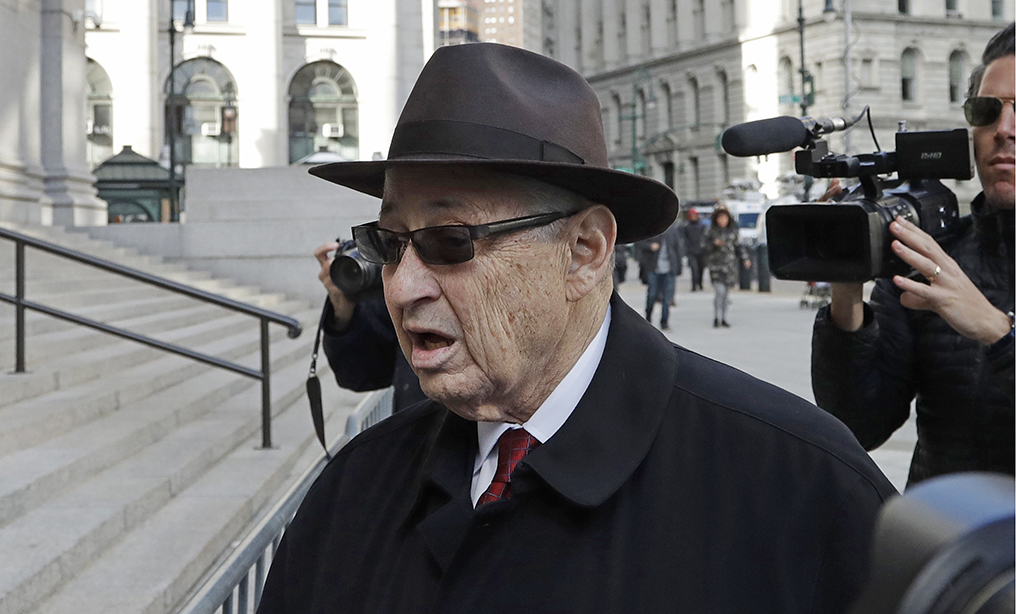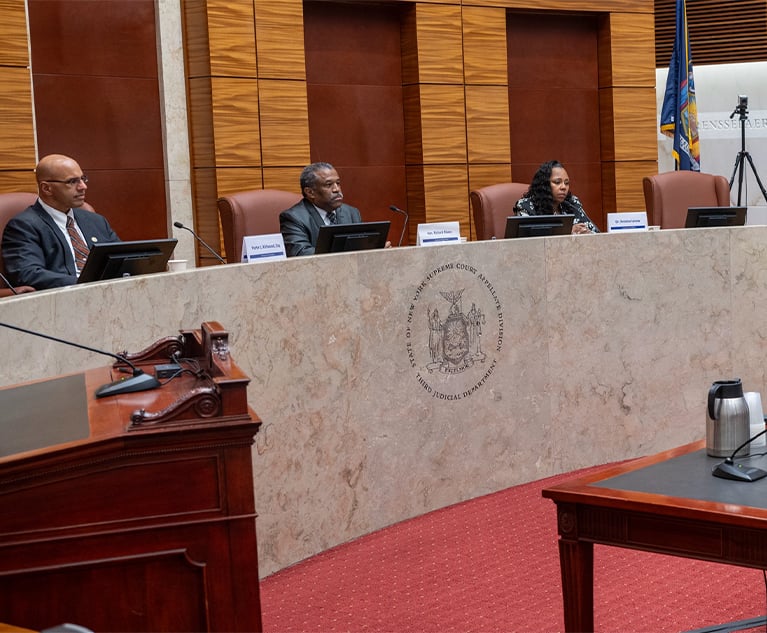As Silver's Retrial Begins, Impact of SCOTUS 'McDonnell' Makes Early Debut
Silver's counsel, Allen & Overy partner Michael Feldberg, previewed the defense strategy of attacking the definitive link between an official act and a thing of value to prove a bribery charge after McDonnell v. United States.
April 30, 2018 at 02:35 PM
5 minute read

For most of the participants on-hand for the start of former state Assembly Speaker Sheldon Silver's corruption trial redux, the occasion was notable as much for its replay of Silver's first trial as what had changed.
The attorneys were different on both sides, while the judge, U.S. District Judge Valerie Caproni of the Southern District of New York, still presides from the bench. The charges haven't changed since Silver was indicted in 2015 on honest services, extortion and illegal monetary transactions, for which he was found guilty on all seven counts in November that year. Silver, too didn't appear to have changed much, the 74-year-old looking little worse the wear in his blue windowpane suit. He even appeared to be wearing his old state assembly lapel pin.
What has changed is the law—and the impact of the change was made apparent most clearly in the approach of Silver's attorney, Allen & Overy partner Michael Feldberg, during opening arguments.
The U.S. Supreme Court's decision in McDonnell v. United States narrowed the application of federal bribery statutes to those where a clear quid pro quo of something of value results in an official act taken by the elected official. The lack of clear language in Silver's jury instructions to this effect during the last trial led the U.S. Court of Appeals for the Second Circuit to begrudgingly vacate the former assembly speaker's conviction in July 2017.
Feldberg, laying out the defense's strategy in the coming weeks-long trial, did all he could to focus the jury on the needed elements to prove a crime in the wake of McDonnell, asking the jurors to consider what the terms of the alleged deal between Silver and the other sides of the conspiracies were, when and how the alleged quid pro quo was put in place, and what the official acts specifically were that Silver was to take in exchange for the benefit.
Sure, Feldberg acknowledged, some of what Silver did may be displeasing to the jury, maybe even unseemly, and possibly not as honest as would be ideal. But, he argued, the actions were not only legal but within Silver's right as a former member of Albany's so-called “three men in a room” power brokers.
“It is not a crime to be a politician—even a powerful one,” Feldberg said.
At the core of the government's case are two schemes, both of which hinge on referral fees paid to Silver by two different law firms—Weitz & Luxenberg, for asbestos-induced mesothelioma cancer cases, and Goldberg & Iryami, for tax certiorari work. In the former, Silver allegedly induced former Columbia University Dr. Robert Taub in to referring his cancer patients, in exchange for state funding for research and other perks, while receiving rainmaker fees from the law firm.
In the latter, Silver allegedly orchestrated a complex scheme that saw major real estate companies dependent on sun-setting state real estate laws send their tax work to Goldberg & Iryami where, unbeknownst to them, Silver received referral fees for the business.
The government's attempt to construction criminal acts out of the details of these were doomed to fail, Feldberg said.
“Everything that happened in this case was not only legal, but was designed and did help people,” he told the jury. Behind him, as he spoke, slides flashed on the large screen opposite the jury: “NO CRIME = NOT GUILTY”
Departing from the previous trial where Silver's attorneys sought to strike a respectful tone by referring to the defendant always as “Mr. Silver,” Feldberg referred to the former assembly speaker informally, by his nickname “Shelly,” and asked the jury to exercise the same fairness and open-mindedness they would expect for themselves or someone they loved. He implored them to “take the burden of these unfair charges from the shoulders of a man who did not commit any crime.”
During its opening statement, the government appeared committed to the game plan with which it previously won. Former assistant U.S. attorney Carrie Cohen, now a partner at Morrison & Foerster (and who was on hand for a portion of the morning proceedings) spoke of power, greed and corruption. Assistant U.S. Attorney A. Damian Williams echoed those themes in his own opening, turning Cohen's gold mines into a golden goose, and reiterating accusations of lie after lie told by Silver meant to keep not only the public but even those close to him from learning of the schemes that netted him approximately $5 million.
“This was not politics as usual,” Williams said, echoing another line from the government's previous opening. “This was politics as profits, and no one was better at this than Sheldon Silver.”
Many of the government's previous witnesses are expected to return to the stand, including Taub, who was set to begin testimony Monday. What they will show, along with the documents and recordings to be deployed by the government, would show the “overwhelming evidence” evidence of Silver's “lies … lies designed to keep everyone in the dark.”
The most important difference between the fall 2015 trial and the one begun Monday are the 15 persons sitting in the jury box. The ten women and five men—the 12 jurors and three alternates—ultimately hold Silver's fate in their hands. Another additional change in personnel was reflected as U.S. Attorney Geoffrey Berman attended Williams' opening statement, mirroring the appearance of his predecessor, Preet Bharara, at Silver's 2015 trial.
This content has been archived. It is available through our partners, LexisNexis® and Bloomberg Law.
To view this content, please continue to their sites.
Not a Lexis Subscriber?
Subscribe Now
Not a Bloomberg Law Subscriber?
Subscribe Now
NOT FOR REPRINT
© 2025 ALM Global, LLC, All Rights Reserved. Request academic re-use from www.copyright.com. All other uses, submit a request to [email protected]. For more information visit Asset & Logo Licensing.
You Might Like
View All

Law Firms Expand Scope of Immigration Expertise Amid Blitz of Trump Orders
6 minute read
'Reluctant to Trust'?: NY Courts Continue to Grapple With Complexities of Jury Diversity
Trending Stories
- 1Uber Files RICO Suit Against Plaintiff-Side Firms Alleging Fraudulent Injury Claims
- 2The Law Firm Disrupted: Scrutinizing the Elephant More Than the Mouse
- 3Inherent Diminished Value Damages Unavailable to 3rd-Party Claimants, Court Says
- 4Pa. Defense Firm Sued by Client Over Ex-Eagles Player's $43.5M Med Mal Win
- 5Losses Mount at Morris Manning, but Departing Ex-Chair Stays Bullish About His Old Firm's Future
Who Got The Work
J. Brugh Lower of Gibbons has entered an appearance for industrial equipment supplier Devco Corporation in a pending trademark infringement lawsuit. The suit, accusing the defendant of selling knock-off Graco products, was filed Dec. 18 in New Jersey District Court by Rivkin Radler on behalf of Graco Inc. and Graco Minnesota. The case, assigned to U.S. District Judge Zahid N. Quraishi, is 3:24-cv-11294, Graco Inc. et al v. Devco Corporation.
Who Got The Work
Rebecca Maller-Stein and Kent A. Yalowitz of Arnold & Porter Kaye Scholer have entered their appearances for Hanaco Venture Capital and its executives, Lior Prosor and David Frankel, in a pending securities lawsuit. The action, filed on Dec. 24 in New York Southern District Court by Zell, Aron & Co. on behalf of Goldeneye Advisors, accuses the defendants of negligently and fraudulently managing the plaintiff's $1 million investment. The case, assigned to U.S. District Judge Vernon S. Broderick, is 1:24-cv-09918, Goldeneye Advisors, LLC v. Hanaco Venture Capital, Ltd. et al.
Who Got The Work
Attorneys from A&O Shearman has stepped in as defense counsel for Toronto-Dominion Bank and other defendants in a pending securities class action. The suit, filed Dec. 11 in New York Southern District Court by Bleichmar Fonti & Auld, accuses the defendants of concealing the bank's 'pervasive' deficiencies in regards to its compliance with the Bank Secrecy Act and the quality of its anti-money laundering controls. The case, assigned to U.S. District Judge Arun Subramanian, is 1:24-cv-09445, Gonzalez v. The Toronto-Dominion Bank et al.
Who Got The Work
Crown Castle International, a Pennsylvania company providing shared communications infrastructure, has turned to Luke D. Wolf of Gordon Rees Scully Mansukhani to fend off a pending breach-of-contract lawsuit. The court action, filed Nov. 25 in Michigan Eastern District Court by Hooper Hathaway PC on behalf of The Town Residences LLC, accuses Crown Castle of failing to transfer approximately $30,000 in utility payments from T-Mobile in breach of a roof-top lease and assignment agreement. The case, assigned to U.S. District Judge Susan K. Declercq, is 2:24-cv-13131, The Town Residences LLC v. T-Mobile US, Inc. et al.
Who Got The Work
Wilfred P. Coronato and Daniel M. Schwartz of McCarter & English have stepped in as defense counsel to Electrolux Home Products Inc. in a pending product liability lawsuit. The court action, filed Nov. 26 in New York Eastern District Court by Poulos Lopiccolo PC and Nagel Rice LLP on behalf of David Stern, alleges that the defendant's refrigerators’ drawers and shelving repeatedly break and fall apart within months after purchase. The case, assigned to U.S. District Judge Joan M. Azrack, is 2:24-cv-08204, Stern v. Electrolux Home Products, Inc.
Featured Firms
Law Offices of Gary Martin Hays & Associates, P.C.
(470) 294-1674
Law Offices of Mark E. Salomone
(857) 444-6468
Smith & Hassler
(713) 739-1250







